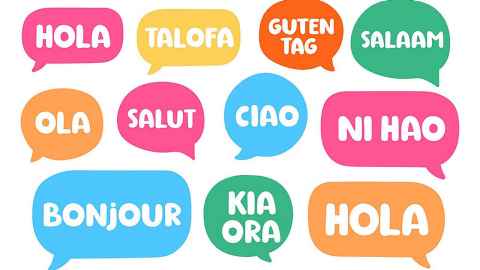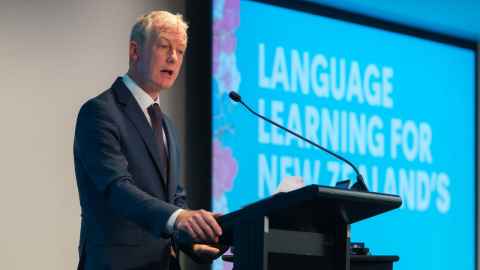Learning a second language should be core curriculum
1 September 2025
Second language learning should be central to the New Zealand Curriculum, according to a new report.

With Chinese Language Week running in Aotearoa New Zealand from 31 August to 6 September, the University of Auckland is spotlighting a national report that calls for second language learning to become a core part of the New Zealand curriculum.
The report, Language Learning for New Zealand’s Future, emerged from a landmark forum co-hosted by the University of Auckland, the New Zealand Chinese Language Week Trust and the New Zealand Association of Language Teachers.
It brings together voices from education, government, business, and youth to address the decline in second language learning across the country.
“Language learning matters – at individual, community, and international levels,” says Dr Erik Lithander, Deputy Vice-Chancellor Strategic Engagement at the University of Auckland. “Languages build cognitive flexibility, cultural empathy, and boost global employability.”
New Zealand is now one of the few OECD countries without compulsory language learning in its curriculum. Enrolments have dropped to their lowest point in nearly a century, with only one in five secondary students studying a second language.
The report argues that this decline is contributing to New Zealand’s fall in global education rankings and weakening its international competitiveness.
The forum’s top recommendation is clear: make second language learning a core requirement for Years 7 to 10, with three to four hours of weekly instruction.
The report also calls for differentiated learning pathways, increased teacher support, a national languages policy, and the use of AI and hybrid learning models to improve access and equity.

Chinese Language Week provides a timely reminder of the value of multilingualism, says Associate Professor Danping Wang, who leads the University's Chinese language programme and teaches learner at various levels of proficiency
Wang includes AI in her teaching and has redesigned her curriculum to specifically create space for students to explore AI tools in project-based learning design.
"Chinese remains one of the most taught second languages in New Zealand, and the University of Auckland continues to play a leading role in advancing Chinese language education and research," she says.
“But while a national language policy can ensure students’ right to learn a language, educators now face the reality of an AI seachange in language teaching."
Wang says traditional approaches that focus narrowly on linguistic skills are vulnerable to cheating and increasingly replaceable by AI.
"Principals and parents are asking how language learning can generate broader, augmented skills that prepare students for future careers," she says.
She believes university-based language teaching researchers must lead this transformation through research, innovation, and collaboration with stakeholders across the country, and around the world.
Whichever method of language teaching is used, Lithander says language pathways must begin well before university level.
“Language is a way to connect local communities to global opportunities. We need to restart national conversations about language policy and push for dedicated curriculum space.”
The report also highlights the cognitive and cultural benefits of language learning, with neuroscience showing that learning languages strengthens brain function, improves literacy and numeracy, and fosters intercultural understanding.
Keynote speaker at the forum American professor Barbara Oakley said: “When you learn a language, you become smarter.”
She says language learning activates both conscious and unconscious brain systems, enhancing memory, problem-solving and learning across subjects.
The report encourages teachers to support its recommendations, especially as the national curriculum refresh and NCEA reforms present a rare opportunity for systemic change.
Key recommendations:
- Make second language learning core in Years 7–10, with three to four hours weekly
- Create differentiated pathways for heritage, native and second-language learners
- Expand teacher supply
- Develop a national languages policy for strategic direction
- Support distance and hybrid learning to improve access and equity
- Use AI and digital tools to enhance learning but still preserve vital human connection
Media contact
Julianne Evans | Media adviser
M: 027 562 5868
E: julianne.evans@auckland.ac.nz